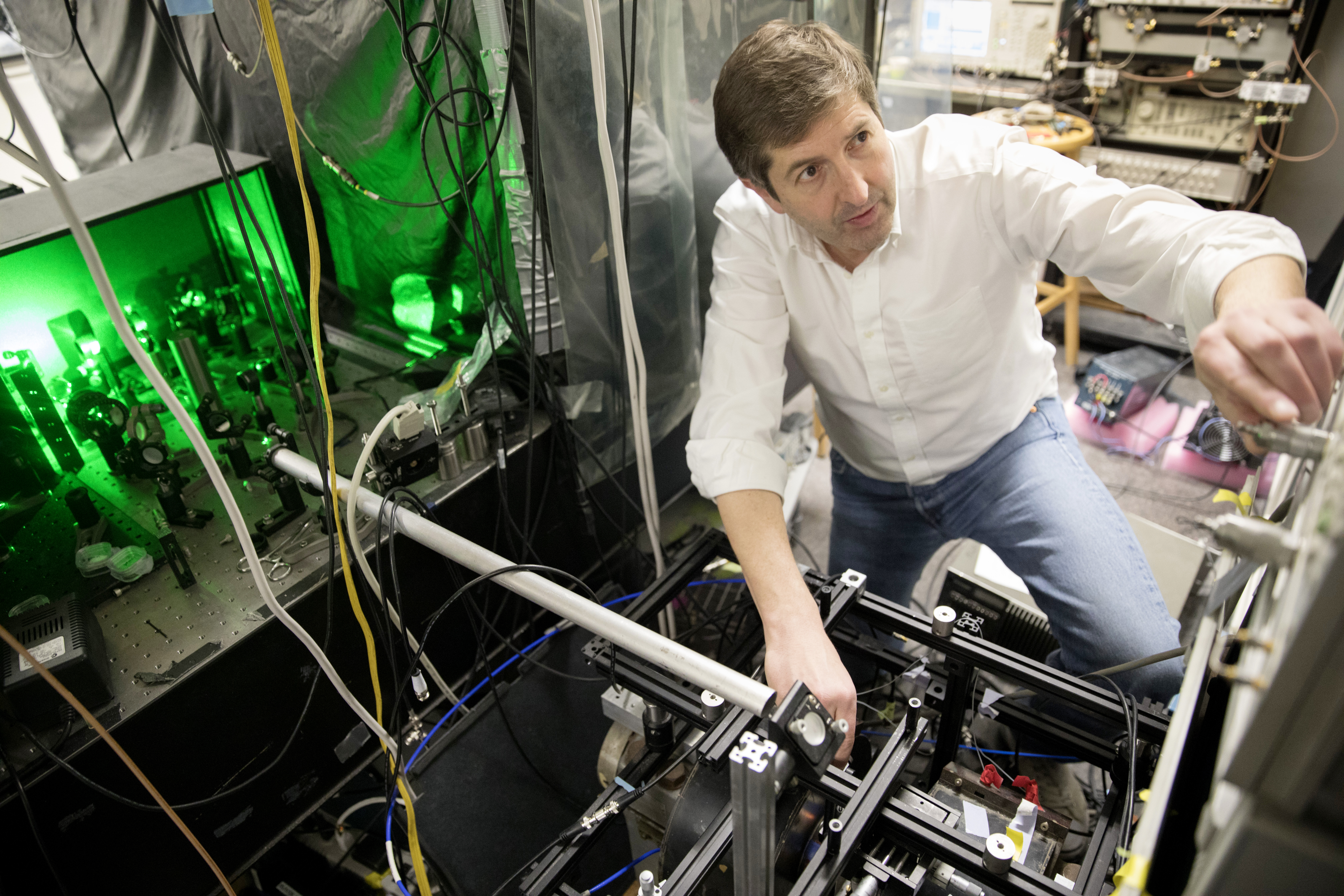On August 22, 2019, the University of Maryland announced the launch of the Quantum Technology Center (QTC), which aims to translate quantum physics research into innovative technologies.
The center will capitalize on the university’s strong research programs and partnerships in quantum science and systems engineering, and pursue collaborations with industry and government labs to help take promising quantum advances from the lab to the marketplace. QTC will also train students in the development and application of quantum technologies to produce a workforce educated in quantum-related engineering.
The new center is a collaboration between UMD’s Department of Physics in the College of Computer, Mathematical, and Natural Sciences (CMNS) and UMD’s Department of Electrical and Computer Engineering in the A. James Clark School of Engineering.
"The Quantum Technology Center will add to the University of Maryland’s world-renowned leadership in the quantum fields, including physics, engineering, computer science, and materials research," said Laurie Locascio, vice president for research at UMD. "This new center will build on these strengths to develop future quantum technology and new applications, and to train students and researchers in quantum technology."
The announcement comes at a pivotal time when quantum science research is expanding beyond physics into materials science, engineering, computer science, chemistry and biology. Scientists across these disciplines are looking for ways to exploit quantum physics to build powerful computers, develop secure communication networks, and improve sensing and imaging capabilities. In the future, quantum technology could also impact fields such as artificial intelligence, energy and medicine.
 Ronald Walsworth. Credit: Kris Snibbe/Harvard. Click image to download hi-res version.
Ronald Walsworth. Credit: Kris Snibbe/Harvard. Click image to download hi-res version.
The director of QTC will be Ronald Walsworth, who recently joined UMD after serving on the faculty at Harvard University and as a senior physicist at the Smithsonian Astrophysical Observatory.
“We are thrilled that Dr. Ronald Walsworth has chosen the University of Maryland and our commitment to accelerating quantum research and discovery,” said Darryll J. Pines, dean of the A. James Clark School of Engineering and Farvardin Professor. “As a signature senior hire for Maryland and as the inaugural director of the Quantum Technology Center, Dr. Walsworth brings a critical expertise in quantum sensing, measurement, and instrumentation to College Park.”
Walsworth is an expert in utilizing quantum physics to develop advanced measurement tools for medicine, planetary science and fundamental physics. He holds several patents on a quantum sensing technology that uses an optically active defect in diamond to probe tiny changes in electromagnetic fields and temperature.
Walsworth’s lab spun off two startups that apply quantum sensing technology to biomedical diagnostics, and he has served as a scientific advisor for several technology companies including Quantum Diamond Technologies Inc., Butterfly Network, Quantum-Si and Hyperfine Research.
He is also a fellow of the American Physical Society and received its 2005 Francis M. Pipkin Award for his work in developing and applying precision measurement tools. Walsworth received his bachelor’s degree in physics from Duke University in 1984 and his Ph.D. in physics from Harvard University in 1991.
“I am excited to join the strong quantum community at the University of Maryland and work together to make QTC a world leader in quantum technology development, translation, and education,” said Walsworth, who joined UMD for Fall 2019 as the Minta Martin Professor in the Department of Electrical and Computer Engineering with a joint appointment in the Department of Physics.
QTC will initially draw members from the Departments of Electrical and Computer Engineering, Physics, and Computer Science. New faculty members have also been hired, including Electrical and Computer Engineering Assistant Professor Cheng Gong and Physics Assistant Professors Alicia Kollár and Norbert Linke.
“We are proud to work with our colleagues in engineering to jointly establish the Quantum Technology Center,” said Amitabh Varshney, dean of CMNS. “QTC will enable the rapid development of quantum technologies through high-impact research that spans sensors, secure communication, and advanced computation.”
QTC will have laboratory space in the Jeong H. Kim Engineering Building, the Physical Sciences Complex, and the Clark School’s new E.A. Fernandez IDEA (Innovate, Design and Engineer for America) Factory, which is dedicated to creative innovation and entrepreneurship by students and faculty and is expected to open in 2021. The center will be administered through UMD’s Institute for Research in Electronics and Applied Physics.
The new center will add to the university’s world-renowned leadership in the quantum fields, which includes being ranked No. 6 in quantum and atomic physics by U.S. News & World Report. UMD is also home to two quantum research partnerships with the National Institute of Standards and Technology—the Joint Quantum Institute and the Joint Center for Quantum Information and Computer Science—as well as a research collaboration with the Army Research Laboratory.
In addition, UMD quantum faculty members are also entrepreneurs. The quantum computing startup IonQ, which aims to bring general-purpose quantum computers to market, was co-founded by UMD Distinguished University Professor Christopher Monroe.
Media Relations Contact: Abby Robinson, 301-405-5845, This email address is being protected from spambots. You need JavaScript enabled to view it.
University of Maryland
College of Computer, Mathematical, and Natural Sciences
2300 Symons Hall
College Park, MD 20742
www.cmns.umd.edu
@UMDscience
 Donna Strickland visited UMD on 9/19/19.
Donna Strickland visited UMD on 9/19/19.
